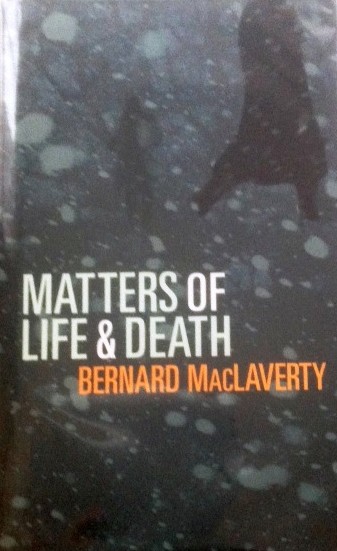Inspiring Older Readers
 posted on 16 Mar 2022
posted on 16 Mar 2022
Matters of Life & Death and Other Stories by Bernard MacLaverty
The Irish writer Bernard MacLaverty was perhaps better known in the 1980s than he is now. In the 80s he published a couple of novels – Lamb and Cal – which seemed to catch the mood of the times, certainly as far as contemporary Ireland at the height of the Troubles was concerned. Both of these novels were made into highly acclaimed films. I know I read both books at the time but they have left little lasting impression. I seem to recall thinking that Cal in particular was overwrought and hard-going but at this distance both probably deserve reading again.
And then I read no MacLaverty for well over thirty years, until his novel Midwinter Break caught my attention. Quiet, domestic, wonderfully observed, this novel about an ageing couple on a short weekend break in Amsterdam at times seems little short of miraculous in its ability to depict what reviewer Peter Kemp called “absorbing actuality” (reviewed here on Letterpress).
But beyond Midwinter Break I’m afraid I still struggle with MacLaverty’s novels. A couple I found myself admiring for their ambition and determination rather than enjoying, and certainly of those I have read nothing has struck me as being as moving or as convincing as Midwinter Break.
But his short stories are a different matter: they are surely MacLaverty’s greatest achievements. He has written five collections (now available as Collected Stories in paperback from Vintage) with a recent sixth collection, Blank Pages (2021), currently only in hardback.
I recently read the 2006 collection, Matters of Life & Death and while I didn’t feel that all of the stories quite met the same astonishingly high standard I finished it determined to read more.
His short stories all have the same hallmarks – wonderful, apparently effortless prose that never strains for effect; acute observation; deep humanity and compassion; a rootedness in the real life of Ireland (especially Ulster of the Troubles); and an aliveness to ageing and mortality and stoicism that can be bleak but is never gratuitously depressing. And humour too – especially in the dialogue and in the often beautifully wrought inner monologues of their characters.
But more remarkable, while retaining these signature characteristics his stories also have extraordinary range. For example, in this volume there is Winter Storm (a middle aged poet is working as a visiting lecturer at a university in Iowa); The Assessment (an old lady with dementia is assessed prior to moving into residential care); and Visiting Takabuti (an elderly woman takes her nephews to see Takabuti, the Egyptian mummy at the Ulster Museum, Belfast). Despite their widely differing settings, these are pitch-perfect, bravura stories, utterly involving and completely convincing.
And then there is On the Roundabout and A Trusted Neighbour: of the various stories I have read set directly in and concerning Northern Ireland at the height of the Troubles, these are simply amongst the finest – utterly unflinching, perfectly judged, these are swift, economical stories that speak powerfully from a deep reservoir of personal experience.
There is also The Clinic. This is the simplest and most graceful story in the collection and has something of the tone of the novel Midwinter Break. It is little more than a vignette, really: an ageing man goes to a health centre for a check-up about which he is extremely anxious; he observes those around him and finds solace in a Chekhov short story he is rereading. It is a gentle little masterpiece.
In the longest story here, Up the Coast, a young woman, a painter, is raped while camping on her own in an isolated windswept spot on the Scottish coast. I felt that MacLaverty’s touch in this story was less sure and that perhaps he wasn’t fully in control of his subject matter. It seemed one of the few in which the characters were not quite fully realised.
But these caveats aside, the qualities that MacLaverty’s stories have in abundance – sureness, economy, wonderful control, peerless prose, acute observation (“absorbing actuality”) – will surely keep most readers returning for more. He is without question one of the contemporary masters of the short story form. I am looking forward to buying the Collected Stories and slowly working my way through all of them.
Alun Severn
March 2022
Bernard MacLaverty elsewhere on Letterpress: